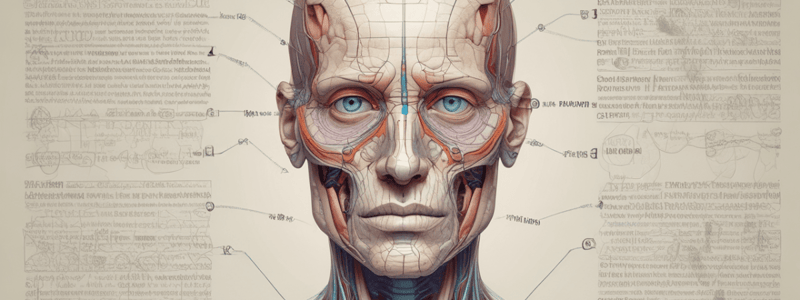Podcast
Questions and Answers
What does the suffix '-cyst' mean in medical terminology?
What does the suffix '-cyst' mean in medical terminology?
- pertaining to a gland
- pertaining to a cell
- pertaining to a muscle
- pertaining to a fluid-containing sac (correct)
What is the meaning of the prefix 'dermat-' in medical terminology?
What is the meaning of the prefix 'dermat-' in medical terminology?
- pertaining to the skin (correct)
- pertaining to the liver
- pertaining to the heart
- pertaining to the kidneys
What does the prefix 'leuk-' mean in medical terminology?
What does the prefix 'leuk-' mean in medical terminology?
- pertaining to blood plasma
- pertaining to platelets
- pertaining to red blood cells
- pertaining to white blood cells (correct)
What is the meaning of the suffix '-itis' in medical terminology?
What is the meaning of the suffix '-itis' in medical terminology?
What does the prefix 'adren-' mean in medical terminology?
What does the prefix 'adren-' mean in medical terminology?
What is the meaning of the prefix 'nephro-' in medical terminology?
What is the meaning of the prefix 'nephro-' in medical terminology?
What does the prefix 'gynec-' mean in medical terminology?
What does the prefix 'gynec-' mean in medical terminology?
What is the meaning of the prefix 'hepat-' in medical terminology?
What is the meaning of the prefix 'hepat-' in medical terminology?
Flashcards are hidden until you start studying
Study Notes
Medical Terminology
Learning Objectives
- Learn and understand new medical terms
- Pronounce common medical terms correctly
Combining Forms
- cyst(o): relating to a bladder or fluid-containing sac (e.g., cystitis, ovarian cyst)
- cyt(o): relating to a cell (e.g., cytology, cytoplasm)
- acr(o): relating to an extremity (e.g., acromegaly)
- dermat(o): relating to the skin (e.g., dermatitis)
- leuk(o): relating to white blood cells (e.g., leukemia)
- erythr(o): relating to red blood cells (e.g., erythrocyte)
- aden(o): relating to a gland (e.g., lymphadenopathy)
- lith(o): relating to a stone (e.g., nephrolithiasis)
- dys-: meaning difficult, painful, or abnormal (e.g., dyspnea, dysmenorrhea, dysfunction)
More Combining Forms
- enter(o): relating to the intestines (e.g., enteropathy)
- melan-: meaning black (e.g., melanoma)
- arthro-: relating to a joint (e.g., arthroscopy, arthritis)
- my(o): relating to muscle (e.g., myalgia, myositis)
- nas(o): relating to the nose (e.g., nasal cavity)
- blephar(o): relating to an eyelid (e.g., blepharitis)
- brady-: meaning slow (e.g., bradycardia)
- gynec(o): relating to females or the female reproductive organs (e.g., gynecology)
- nephr(o): relating to the kidney (e.g., nephrology)
- neur(o): relating to a nerve or the nervous system (e.g., neurology)
- hepat(o): relating to the liver (e.g., hepatitis)
- oophor(o): relating to the ovary (e.g., oophorectomy)
- cervic(o): relating to the neck or the uterine cervix (e.g., cervical lymph node, cervical cancer)
- chondr(o): relating to cartilage (e.g., chondritis)
- cost(o): relating to a rib (e.g., intercostal muscle)
- hyster(o): relating to the uterus (e.g., hysteroscope)
- oste(o): relating to bone (e.g., osteoarthritis)
Even More Combining Forms
- ot(o): relating to the ear (e.g., otitis media)
- adip-: meaning fat (e.g., adipose tissue)
- inguin(o): relating to the groin (e.g., inguinal hernia)
- cutane(o): relating to the skin (e.g., subcutaneous)
- thorac(o): relating to the chest (e.g., thoracic cavity)
- cephal(o): relating to the head (e.g., cephalhematoma)
- cerebell(o): relating to the cerebellum
- cerebr(o): relating to the cerebrum or brain (e.g., cerebrovascular accident - CVA)
- adren(o): relating to the adrenal glands (e.g., adrenal cortex)
- thromb(o): relating to a clot (e.g., thrombophlebitis)
- bronch(o): relating to the bronchus (e.g., bronchitis)
- pleur(o): relating to the pleura (e.g., pleural cavity)
- gloss(o): relating to the tongue (e.g., glossitis)
Studying That Suits You
Use AI to generate personalized quizzes and flashcards to suit your learning preferences.




